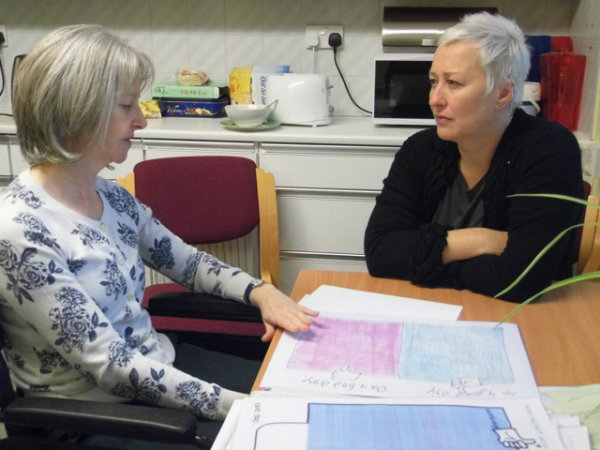
By Donna Hartley, support adviser at People2People (P2P), Shropshire’s independent social work practice
A one-page profile is a great way of capturing what is important to someone and what good support looks like for them. It also provides a very useful piece of information that can be understood clearly by anyone who reads and studies it. I find people relax when we are creating a one-page profile, and when someone is relaxed and happy, their confidence blossoms.
Basically a one-page profile is a very simple and concise way of communicating important information about a person – what is important to them, what people like and admire about them and how they want to be supported – on a single sheet of paper. They help me understand more about a person and offer an insight into what someone might want and how they want to achieve things. It is a clear and concise tool that helps communicate the personality of an individual. It can also identify what pace a person wishes to make changes to their lives. It definitely puts the person in the driving seat.
We help people to write their one-page profile through peer support planning sessions, where a person is invited to come and discuss what they want in life and how it can be achieved. Initially there is a worker and a peer support volunteer who help develop the one-page profile, which is part of the person’s support plan.
Individuals must shape their profiles
It is essential that people actively take part in the creation of their one-page profiles and take ownership of it. We can throw ideas into the pot but in the end it is down to the individual as to how they use it and, indeed, if they move forward with it.
One-page profiles can be as detailed or as simple as any one person wants it to be. They often take two or three sessions to create and we encourage everyone to take home their one-page profiles and work on them outside of the peer support sessions. Sometimes we use the “steps” process; this can help a person map out their goals in a very simple and visual way. We work with people and try to encourage them to make steps forward in their lives to achieve the goals they have set themselves. By mapping things out in this way, people are able to see where they are now and, further up the steps, where they can be in the future. Timescales are discussed but only put on the profile if the person wants them to be.
No bureaucracy or council jargon
A one-page profile helps me as a worker to identify what is required as part of a person being able to move forward. They are not bureaucratic and can be colourful. They describe in simple terms what someone wants out of life. They are not shrouded in “council jargon” or look like a document that nobody wants to read. They are informative and creative and describe an individual and their dreams. With the information they provide, I can contact the appropriate services and organisations that would best suit that person.
I recently worked with a man who had ideas of what he wanted to do but had never put them in place. He has always had things done for him. He came to P2P for two peer support sessions and together we developed a plan of what he wanted to do and how he was going to achieve it. He was given his one-page profile to take home and also given a weekly planner, so he could map out what he needed and wanted to do in any one week.
Doing things with people, not for them
It is very easy to do things for people as sometimes it is quicker, but it doesn’t help in the long term. If phone calls have to be made we will encourage people to make the calls themselves while in a peer support session; they know they have support from my team if they have any difficulties.
It is important to note that I work with people but do not do all the work! If people wish to make differences to their lives they must be willing to put effort in to change it. I always say to people, ‘I will support you all the way, but I want you to support yourself’. A one-page profile is an excellent way of encouraging people to begin to regain control of their own lives.
Further resources on one-page profiles
What are one-page profiles? (Helen Sanderson Associates)
About one-page profiles (Social Care Institute for Excellence)


 Family help: one local authority’s experience of the model
Family help: one local authority’s experience of the model  ‘I spent the first three months listening’: how supportive leadership can transform children’s services
‘I spent the first three months listening’: how supportive leadership can transform children’s services  How senior leaders in one authority maintain a culture of excellence
How senior leaders in one authority maintain a culture of excellence  How staff support ensures fantastic outcomes for children and families
How staff support ensures fantastic outcomes for children and families  Workforce Insights – showcasing a selection of the sector’s top recruiters
Workforce Insights – showcasing a selection of the sector’s top recruiters 

 Facebook
Facebook X
X LinkedIn
LinkedIn Instagram
Instagram
Comments are closed.